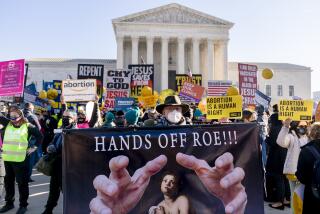Move Is a Reflection of a Weakened President
- Share via
WASHINGTON — George W. Bush’s first term was a tutorial on how a determined and aggressive president can multiply his strength and drive sweeping change from a narrow electoral base.
His second term increasingly looks like the opposite: a bitter lesson in how swiftly a president’s influence can erode and how quickly presidential weakness can breed division in his party.
The withdrawal Thursday of Harriet E. Miers’ nomination to the Supreme Court amid a revolt from conservatives underscored the stark message sent by the failure of Bush’s Social Security restructuring plan and a series of recent uprisings by congressional Republicans -- the president no longer can consistently impose his will on his party, much less the Congress or the country, with his job approval ratings stuck at 45% or lower.
“This is a very simple political equation: presidents govern based on the perception of their clout,” said GOP pollster Bill McInturff. “In most of Bush’s first term, when he was at 60%-plus in his job approval, most people didn’t want to cross the president. And when you are in the range he is now, people feel a little emboldened.”
Beset by these dynamics, Bush is likely to return to the strategy he’s stressed throughout his presidency and look for ways to reassure and energize his conservative base, Republican insiders say.
“The key thing for us is to stabilize the situation and repair the breach with conservatives,” said one GOP strategist familiar with White House thinking, who asked not to be identified when discussing administration affairs.
As part of that effort, the strategist said, Bush is likely to select a replacement for Miers whom “conservatives can rally around.”
The selection of a nominee with a clear conservative record -- such as federal appellate court judges J. Michael Luttig, Priscilla R. Owen or Edith H. Jones -- would meet the right’s demand for a confirmation fight with Democrats that would energize the conservative grass roots.
But at a time when Bush’s approval ratings among independents have fallen to the lowest point of his presidency, a polarizing fight to fill the seat of moderate Justice Sandra Day O’Connor could further narrow the president’s appeal.
“You may solve one problem and exacerbate another,” said Steven Schier, a political scientist at Carleton College in Minnesota who is writing a book on Bush’s leadership style.
The president’s position could grow even more precarious today, when a special prosecutor, Patrick J. Fitzgerald, is expected to announce whether any White House officials have been indicted in the case revolving around the naming of a covert CIA officer whose husband had criticized the administration over Iraq.
If indictments come, following the Miers’ withdrawal and the grim milestone of 2,000 U.S. deaths in Iraq, it would cap one of the most difficult weeks for a president in memory.
“You don’t see many weeks like this,” Schier said.
Bush’s approval rating is running lower than that for any reelected president in the first year of his second term except Richard M. Nixon, who was trapped in the coils of the Watergate scandal. And Bush’s decline has clearly weakened his hand in Washington.
Through Bush’s first term, congressional Republicans demonstrated extraordinary unity in passing an ambitious agenda despite narrow majorities in both chambers -- and a period of Democratic control of the Senate.
That discipline has still been evident at times this year. Republicans locked arms to pass energy and highway bills, a free-trade agreement with Central American nations, and legislation changing bankruptcy laws and limiting class-action lawsuits.
But party splits on other issues have spread like a fracture on a frozen lake, even though Bush’s percentage of the vote in the 2004 election was greater than in 2000 and Republicans expanded their majorities in the House and Senate.
A lack of consensus among Republican lawmakers has effectively forced Bush to shelve his second term’s top domestic priority: the restructuring of Social Security to create individual investment accounts.
Despite emphatic White House opposition, the Senate recently approved 90 to 9 an amendment banning the torture of detainees in the war on terrorism.
On Wednesday, Bush reversed his executive order that allowed contractors working on Hurricane Katrina relief to pay less than the local prevailing wage after House GOP moderates threatened to join Democrats in voting to overturn the policy.
Discontent among House conservatives has forced the White House and the chamber’s GOP leaders to pursue larger budget cuts to offset Katrina-related costs. And on Wednesday, GOP Senate leaders had informed the White House that the Miers nomination faced possibly insurmountable opposition, according to administration and congressional sources.
Adding to the Republican fears of party disarray was the recent decision by California Gov. Arnold Schwarzenegger to skip a fundraiser Bush attended in Los Angeles. Today, Jerry Kilgore, the Republican gubernatorial candidate in Virginia, is skipping a Bush speech in the state, arguing that it is not a political event.
“They are stepping over the body,” said one prominent GOP fundraiser close to the White House, who requested anonymity when discussing Bush. “It’s not just due to his poll numbers.... He has alienated the fiscal conservatives and alienated the social conservatives.”
Republican defection is especially difficult for Bush because, after five years of bruising partisan combat, he attracts few votes from Democratic lawmakers for his priorities. That means resistance from relatively few Republican legislators can deny him majorities.
Some of the GOP dissension may be the inevitable result of a second presidential term, when a president’s influence usually wanes.
“It was a foregone conclusion that members of the president’s party would begin to break ranks because he was no longer up for reelection and they were,” said Nicholas E. Calio, the White House director of legislative affairs during Bush’s first term.
But many analysts believe Bush accelerated that trend by overestimating his ability to muscle Republicans into line on difficult issues, such as the Miers nomination or the restructuring of Social Security.
The GOP strategist familiar with White House thinking said that after the recent reversals, the administration was concluding that it would probably need to defer more to congressional leaders in setting the party’s agenda.
“There is probably going to be some of that,” the strategist said. “It’s not going to be a fundamentally different president by any means. But you make adjustments along the way.”
In the next few months, the strategist added, Bush’s priorities will center on supporting conservative drives for greater budget cuts and working to build a greater party consensus on immigration.
The strategist also said that finding a replacement for Miers who excites the conservative base “could have a catalyzing and energizing effect.”
The challenge may be finding a nominee who can spark that enthusiasm while satisfying another imperative for a president on the defensive: generating a victory in Congress.
A nominee who meets the demands of conservatives would probably guarantee an intense fight from Democrats, and perhaps resistance from some moderate Republicans. And while many conservatives would welcome such a fight, others say Bush needs to be sure he can prevail before provoking it.
“The best way to reverse a declining presidential position is to start winning,” said McInturff, the GOP pollster. “The definition of victory is a confirmed justice sitting on the court, and the best way to strengthen the president’s standing is to start finding areas, like that, where he can start winning.”
More to Read
Get the L.A. Times Politics newsletter
Deeply reported insights into legislation, politics and policy from Sacramento, Washington and beyond. In your inbox twice per week.
You may occasionally receive promotional content from the Los Angeles Times.










